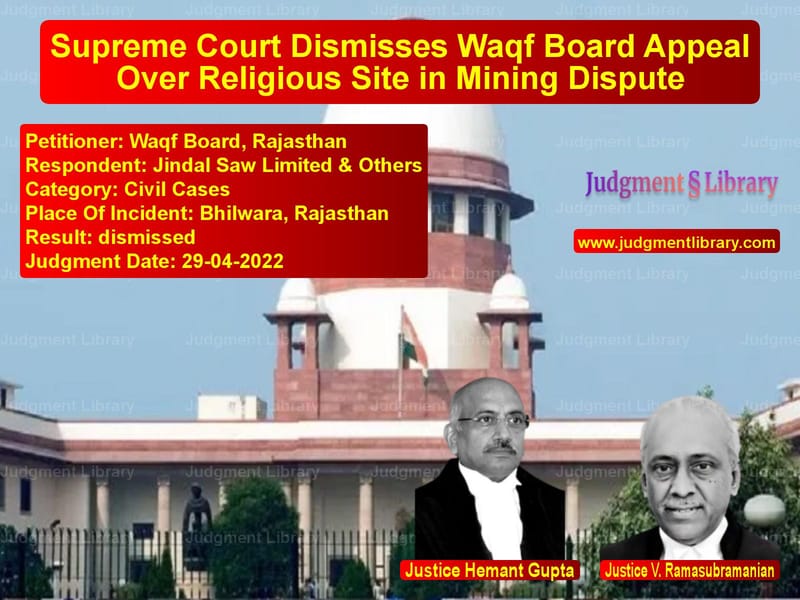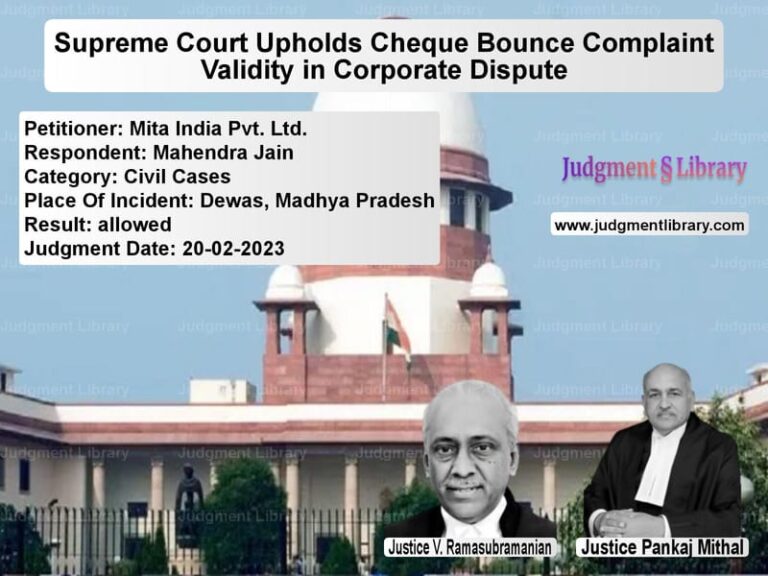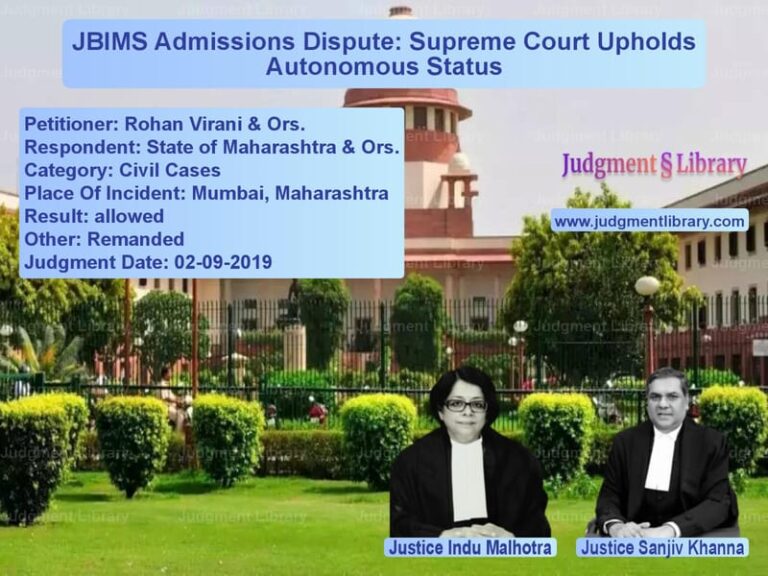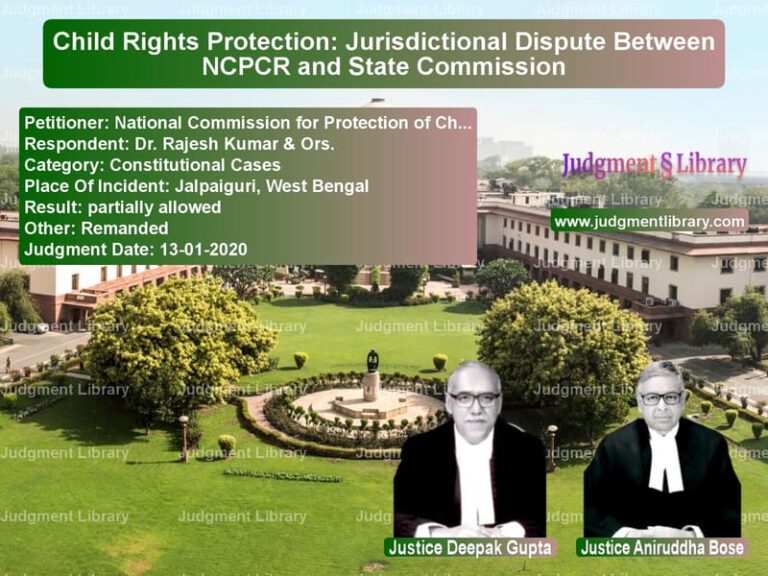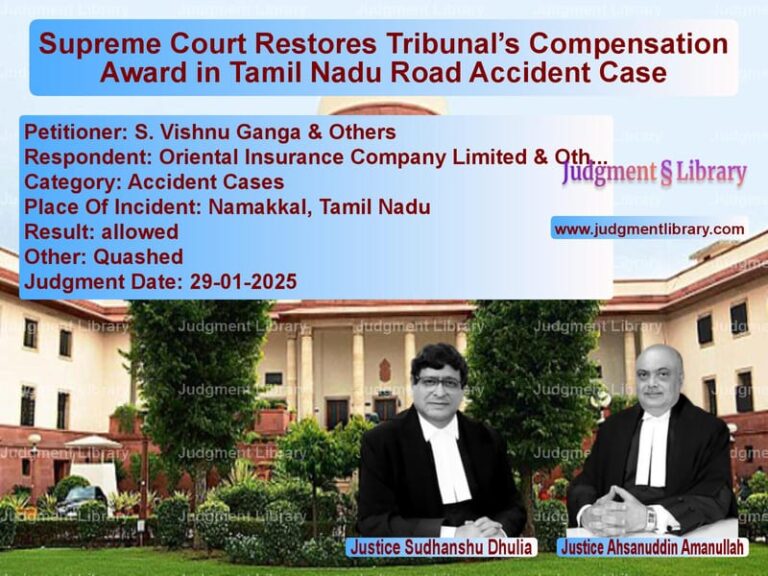Supreme Court Dismisses Waqf Board Appeal Over Religious Site in Mining Dispute
The Supreme Court of India, in the case of Waqf Board, Rajasthan vs. Jindal Saw Limited & Others, dismissed the appeal filed by the Rajasthan Waqf Board against a mining lease granted to Jindal Saw Limited. The Court ruled that there was no substantive evidence proving that the land in question, Khasra No. 6731 in Village Pur, Bhilwara, Rajasthan, contained a religious site that would prevent mining operations.
The judgment is a significant ruling that clarifies the legal status of disputed religious claims over land used for industrial activities. The Court emphasized that a mere dilapidated structure or historical claim cannot automatically confer a religious status unless proven through dedication, user, or grant under the Waqf Act, 1995.
Background of the Case
The dispute arose when Jindal Saw Limited, which had been granted a mining lease over 158 Bigha 12 Biswa in Khasra No. 6731, faced opposition from the Rajasthan Waqf Board. The Waqf Board claimed that the site contained a religious structure known as ‘Tiranga Ki Qalandari Masjid’ and should therefore be protected from mining activities.
The High Court of Rajasthan had previously ruled in favor of Jindal Saw Limited, directing the Waqf Board and other respondents not to interfere with the mining operations. The Waqf Board then challenged this decision before the Supreme Court.
Petitioner’s Arguments
The Waqf Board, represented by its legal counsel, argued that:
- The land in question had been listed as Waqf property in the 1965 Gazette notification.
- The site had historical significance and was used as a place of worship in earlier times.
- The principles of natural justice required protecting religious sites from industrial exploitation.
- The High Court’s ruling failed to consider the evidence supporting the existence of a mosque.
Respondents’ Arguments
Jindal Saw Limited and the State of Rajasthan countered with the following arguments:
- The mining lease was granted after a detailed survey and approval from the relevant authorities.
- The area in question did not contain any functioning place of worship.
- The Waqf Board failed to provide conclusive proof that the structure was an active religious site.
- The land was being used for mining under a legally granted lease, and there were no grounds for interference.
Supreme Court’s Judgment
The Supreme Court bench, comprising Justices Hemant Gupta and V. Ramasubramanian, ruled in favor of Jindal Saw Limited and upheld the High Court’s decision. The key observations of the Court were:
- No Evidence of Religious Use: The Court noted that there was no documented evidence proving that the structure was ever actively used as a mosque.
- Distinction Between Survey Reports: The Court examined the 1965 Gazette notification and found inconsistencies with the survey reports, which showed different land dimensions.
- Legal Definition of Waqf Property: The judgment reaffirmed that for land to qualify as Waqf property, there must be clear evidence of dedication, religious use, or grant.
- Mining Lease Validity: The Court ruled that the mining lease had been granted lawfully, and there was no basis for canceling it based on unsupported religious claims.
- Dismissal of Appeal: The Court found no merit in the Waqf Board’s claims and dismissed the appeal.
Implications of the Judgment
This ruling has significant implications for land disputes involving religious claims:
- Clarity on Waqf Claims: The judgment sets a precedent that mere listing in the Gazette does not automatically confer ownership or prohibit land use.
- Strengthening Industrial Rights: The ruling affirms that legally granted industrial and mining leases cannot be challenged without substantive proof.
- Role of the Judiciary in Religious Disputes: The decision underscores that courts must rely on legal principles rather than historical claims in land disputes.
- Impact on Future Waqf Cases: The judgment provides a framework for assessing similar cases where Waqf Boards claim ownership over land.
Conclusion
The Supreme Court’s verdict in Waqf Board, Rajasthan vs. Jindal Saw Limited & Others is a landmark ruling that reinforces the principle that land ownership and religious claims must be substantiated with strong legal evidence. By dismissing the Waqf Board’s appeal, the Court has ensured that industrial development cannot be obstructed based on unverified claims.
Petitioner Name: Waqf Board, Rajasthan.Respondent Name: Jindal Saw Limited & Others.Judgment By: Justice Hemant Gupta, Justice V. Ramasubramanian.Place Of Incident: Bhilwara, Rajasthan.Judgment Date: 29-04-2022.
Don’t miss out on the full details! Download the complete judgment in PDF format below and gain valuable insights instantly!
Download Judgment: waqf-board,-rajastha-vs-jindal-saw-limited-&-supreme-court-of-india-judgment-dated-29-04-2022.pdf
Directly Download Judgment: Directly download this Judgment
See all petitions in Property Disputes
See all petitions in Landlord-Tenant Disputes
See all petitions in Damages and Compensation
See all petitions in Judgment by Hemant Gupta
See all petitions in Judgment by V. Ramasubramanian
See all petitions in dismissed
See all petitions in supreme court of India judgments April 2022
See all petitions in 2022 judgments
See all posts in Civil Cases Category
See all allowed petitions in Civil Cases Category
See all Dismissed petitions in Civil Cases Category
See all partially allowed petitions in Civil Cases Category

